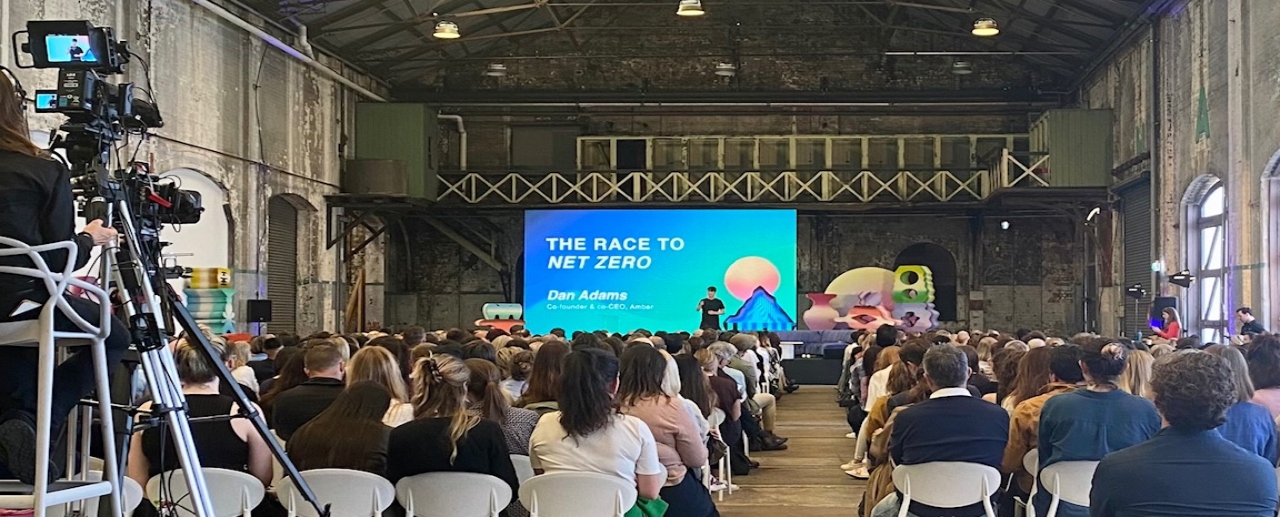Trigger Warning: This post references suicide and sexual assault. If you need to talk to someone, support is available. Call Lifeline on 13 11 14.
“Give us two days and we’ll show you what hope feels like.”
This was the mission of Purpose Conference 2022, sponsored by ImpactInstitute, which took place over two days at Sydney’s Carriageworks.
Each session was as fresh, lively and insightful as the attendees (seriously – what a great group of people), but what really grabbed our attention was in the little details.
We drank from water fountains powered by renewable energy, ate delicious vegan meals, and wore fancy conference lanyards made from recycled shampoo bottles.
Everywhere we looked there was a reminder that purpose isn’t only realised through lofty brand statements, but through our individual and collective experiences and actions.
What else did we learn? Enjoy some key takeaways from our team on the ground.
Corporations offering scale for solutions
Kate Elks, Head of Brand Storytelling
My key takeaway was two-fold: a positive and a challenge.
Listening to a panel involving KPMG AU, Unilever AU/NZ (a BCorp!) and Amazon Web Services being called to account, and those leaders answering with humility and authenticity, was an incredible a-ha moment.
Big business is openly offering scale for solutions – with increasingly positive results.
What surprised me was how often organisations and leaders are conflating purpose with impact. They’re not the same.
Purpose is what drives us; impact is what, or who, changes as a result. So, while there was obviously a focus on purpose, we have some miles to walk until it’s the norm to create, measure and iterate on truly long term, sustained and positive change.
Storytelling for a cohesive community
Sara Caspani, Impact Specialist
“We don’t need enlightened heroes we need cohesive communities”
Relegating social and environmental impact to charities and not-for-profits perpetuates a binary and divisive system (win vs lose, us vs them, for-purpose vs not-for-purpose etc) that underpins many of the problems we are facing.
Developing a shared understanding and responsibility across all levels of society will help us walk towards a future of unity and wellbeing for all (nature included!).
But how do we get there?
In Indigenous societies, the art of storytelling supports communities, validates experiences, fosters connections, and plays a significant role in cultural continuity.
In this period of enormous societal transformation, its best to heed the example set by First Nations people.
Each of us – including and especially the media – has the opportunity and responsibility to drive positive and inclusive social consciousness through storytelling. This means being more intentional about who we give voices to and how.
In a truly equitable society, we need to create the conditions for people with lived experiences to tell their stories on their own terms and reclaim their agency for self-determination.

The pitfalls of automated customer ‘care’
Brianna McShane, Account Director
Technology has transformed our lives for the better in many ways, but it’s also dehumanised our interactions.
I left Purpose Conference both fascinated and alarmed by stories concerning the devastating and (mostly) unintended impact technology has on people’s lives when adequate customer support systems aren’t in place.
Andrew Apostola, CEO at Portable, spoke about a 20-year-old who took his life after believing he’d lost more than $750,000 on the free trading app Robinhood. He went on to describe the Grindr user who was relentlessly assaulted after an ex-boyfriend created a fake account on the dating app, using his photo and personal details.
Despite many calls for help both people were met with automated replies or told nothing could be done. Customer care needs to be factored in at the start of building any technology not as a reaction to a scandal when it’s too late.
New words for a new world
Rian Newman, Account Director + Content Strategist
I’ve always been interested in philosophy and the natural world, so when the two join forces it’s enough to have me on the edge of my seat.
That’s why the standout session for me was a talk from Professor Glenn Albrecht, whose work focuses on the intersection of the ecosystem and human health.
Glenn spoke about the notion of solastalgia: a term he coined to describe the distress produced by environmental change impacting on people while they are directly connected to their home environment.
He said that unlike nostalgia (which traditionally meant home sickness) solastalgia is the feeling you get when you’re already home, but home is being taken away from you.
It’s a melancholy concept, but one that beautifully captures the angst we all feel living through a climate crisis.
Taking meaningful action starts with a deep understanding of yourself and the problem. In that respect, I feel like Professor Albrecht’s session has unlocked a new door for me to walk through.

Thank you for reading. If you need to talk to someone, support is available. Call Lifeline on 13 11 14.
Want to hear more from our team? ImpactInstitute provides a suite of advisory, brand storytelling and events services. Reach out and let’s chat about how we can work with you to bring your purpose to life.
